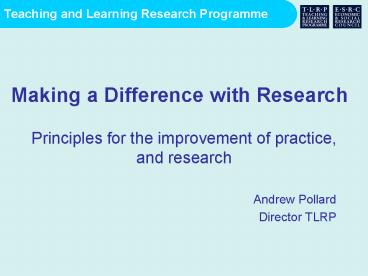Principles for the improvement of practice, and research - PowerPoint PPT Presentation
1 / 33
Title:
Principles for the improvement of practice, and research
Description:
Political, economic and cultural contexts. Informal and formal learning contexts ... Commentaries. Teachers' Guide to Ten Principles' Resources for practitioner ... – PowerPoint PPT presentation
Number of Views:24
Avg rating:3.0/5.0
Title: Principles for the improvement of practice, and research
1
Principles for the improvement of practice, and
research
Making a Difference with Research
- Andrew Pollard
- Director TLRP
2
Making a Difference with Research
- History
- 1988 and all that ..
- Biography
- What is to be done?
3
Professionalism
- The essence of professionalism is the exercise
of skills, knowledge and judgement for the public
good. - But teacher expertise is poorly understood in
our society
4
- Pedagogy is the practice of teaching framed and
informed by a shared and structured body of
knowledge and combined with moral purpose. - By progressively acquiring such knowledge and
mastering pedagogical expertise through initial
formation, continuing development and reflective
experience teachers are entitled to be treated
as professionals. - Teachers should scrutinise and evaluate their
practice to make rationally defensible
professional judgements beyond pragmatic
constraints and/or ideological concerns.
5
Problem
Issue
Dilemmas
Judgement
6
Problem
Issue
Reflect
Plan enquiry
Dilemmas
Collect evidence
Evidence
Judgement
Analyse evidence
Evaluate
7
Three judgements
- Which facet of classroom life should be
investigated and why? - What evidence to collect and how?
- How should the findings be analysed, interpreted
and applied?
8
Three challenges
- Is design of the enquiry appropriate in relation
to the aim? (sample) - Does the evidence really indicate the nature of
what is being investigated? (validity) and would
the same sort of evidence be found again, or by
someone else? (reliability) - Are the conclusions drawn really justified?
(analysis)
9
How is the time to be found?
- Use occasional, but explicit, classroom enquiries
as reflective learning experiences
10
TLRPs aims
- TLRP aims to contribute to significant
improvements in outcomes for learners - at all ages and stages in all sectors and
contexts of education and training, including
informal learning settings, - throughout the United Kingdom
11
Projects funding competitions and associations
2000 2001 2002 2003 2004
2005 2006 2007 2008 2009
2010 2011
Phase I
Phase II
Research training fellows
Scottish extensions
Welsh extensions
Phase III
Northern Irish extensions
Associated projects
WP in HE
TEL
12
Curricular questions
- How can mathematical understanding be best
developed? - Does evidence-based practice in science education
improve outcomes? - How might the teaching of spelling be improved?
- How can ICT support teaching to enhance pupil
learning?
13
Pedagogic questions
- How can group-work be developed most effectively?
- Does developing thinking skills improve
childrens work? - Does learning how to learn enhance performance?
- Does pupil consultation produce educational
benefits?
14
Broader questions
- Which forms of early years provision are most
effective? - Does home-school knowledge-exchange improve
learning outcomes? - How do institutional cultures affect learning?
- Can social inclusion and performance be
reconciled?
15
- From individual projects, we expect findings on
specific questions
16
- From thematic analysis across all projects, we
aim to highlight more enduring educational issues
17
Political, economic and cultural
contexts Informal and formal learning contexts
Learners and learning through the lifecourse
Teachers, teaching and training
Curriculum and domain knowledge Interaction and
pedagogy information technology Assessment and
learning
Learning outcomes Educational issues International
comparisons
18
Ten principles from TLRP
19
Effective teaching and learning .......
20
1. EQUIPS LEARNERS FOR LIFE IN ITS BROADEST SENSE
21
2. ENGAGES WITH VALUED FORMS OF KNOWLEDGE
22
3. RECOGNISES THE IMPORTANCE OF PRIOR EXPERIENCE
AND LEARNING
23
4. REQUIRES THE TEACHER TO SCAFFOLD LEARNING
24
5. NEEDS ASSESSMENT TO BE CONGRUENT WITH LEARNING
25
6. PROMOTES THE ACTIVE ENGAGEMENT OF THE LEARNER
26
7. FOSTERS BOTH INDIVIDUAL AND SOCIAL PROCESSES
AND OUTCOMES
27
8. RECOGNISES THE SIGNIFICANCE OF INFORMAL
LEARNING
28
9. DEPENDS ON TEACHER LEARNING
29
10. DEMANDS CONSISTENT POLICY FRAMEWORKS WITH
SUPPORT FOR TEACHING AND LEARNING AS THEIR
PRIMARY FOCUS
30
For more information
- www.tlrp.org
- Commentaries
- Teachers Guide to Ten Principles
- Resources for practitioner research
- www.rtweb.info
- Practitioner applications for classroom enquiry
- Notes to guide reading
31
- Comprehensive support on key issues in teaching
and learning - TLRP Research briefings
32
- Connecting evidence, practice and policy
- Monday, 24th November 2008
33
Making a Difference with Research
- History
- 1988 and all that ..
- Biography
- What is to be done?






![[PDF] Principles of Epidemiology for Advanced Nursing Practice: A Population Health Perspective: A Population Health Perspective 1st Edition Full PowerPoint PPT Presentation](https://s3.amazonaws.com/images.powershow.com/10087818.th0.jpg?_=20240729071)
























